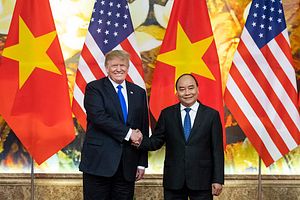By Prashanth Parameswaran
On July 11, the United States and Vietnam commemorated the 25th anniversary of the establishment of diplomatic ties between the two countries, which occurred under former U.S. President Bill Clinton in 1995 after grappling with the legacies of the Vietnam War. The commemoration is an occasion not just to reflect on the remarkable trajectory of ties to date, but also to appreciate the work that continues to be done to develop relations and to assess the opportunities and challenges that lie ahead for both partners.
By any stretch of the imagination, the development of the U.S.-Vietnam relationship in the past quarter century is a remarkable story, and the anniversary is a reminder that this is worth celebrating. In just over two decades, the two countries have broadened and deepened ties across a series of realms and thereby evolved from former Cold War adversaries to increasingly strategic partners in the Asia-Pacific. While the historic trajectory of the relationship has been in no small part due to Vietnam’s own transformation into a dynamic economy and strategic leader in Southeast Asia, it was also because of personalities and peoples on both sides, whether it be towering figures such as John McCain, who helped manage ties through domestic political difficulties, or the shifting attitudes of Vietnamese people over time, with the country registering as one of the most pro-American in the Asia-Pacific in key polls even as Vietnam’s official foreign policy continues to prioritize diversification of ties with multiple powers.
The commemoration is also a reminder of the hard work that continues to be done today to further develop the architecture of the relationship. Policy-wise, beyond historic, headline-grabbing events such as U.S. aircraft carrier visits to Vietnam and ongoing conversations about elevating ties to the level of a strategic partnership (from the historic comprehensive partnership reached during the Obama administration) there is also important functional work ongoing as well, be it advancements on war legacy issues that help reinforce trust in bilateral ties or the launch of a new Peace Corps program in Vietnam, which U.S. Secretary of State Mike Pompeo emphasized in his remarks commemorating the anniversary.
Lastly, the occasion should also serve as a reminder of the work that remains to be done, which policymakers on both sides are well aware of. Some of this involves the bilateral relationship itself, be it speeding up the pace of defense cooperation or reinvigorating economic ties, an agenda item that Vietnam’s Ambassador to the United States Ha Kim Ngoc has highlighted following the loss of steam following the U.S. withdrawal from the Trans-Pacific Partnership and broader regional concerns about some aspects of the Trump administration’s foreign policy. But other aspects involve managing the broader environment in which the U.S.-Vietnam relationship develops, be it the strategic landscape in the Asia-Pacific, with an increasingly assertive China making gains in the security domain, or the domestic dynamics of two different political systems with differences in areas such as human rights, which will be at play as the United States holds presidential elections in November 2020 and Vietnam holds its quinquennial Party Congress in early 2021.
In analyzing the past, present, and future of U.S.-Vietnam relationship, the key to continuing to improve ties has to be rooted in the ability of both sides to advance opportunities, tackle challenges, and manage differences. Put differently, as Vietnam Communist Party chief and President Nguyen Phu Trong wrote in a letter addressed to U.S. President Donald Trump in line with the anniversary, partnership between the two countries would progress if there is “a mentality to let go of the past, overcome differences, and utilize similarities towards the future.” That, as ever, will be the test for both sides as they manage both the bilateral relationship as well as wider domestic, regional, and global priorities not only in 2020, but for the next 25 years more generally.

No comments:
Post a Comment